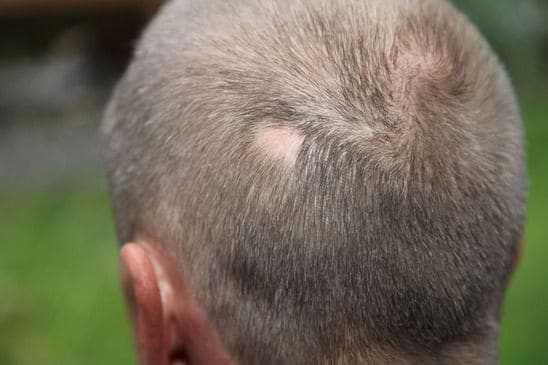

 Want to earn continuing education credit for this article? Learn more.
Want to earn continuing education credit for this article? Learn more.
A hair loss condition typically affecting the scalp, alopecia areata can be psychologically devastating to those affected. Very different from male pattern baldness, alopecia areata is believed to be a result of an immune system abnormality. While assorted pharmaceutical aids are used to treat this loss of hair, their high level of toxicity and mediocre effectiveness makes this condition a likely candidate for complementary or alternative medicine. Massage therapists with training in aromatherapy are in a unique position of being able to offer their clients with alopecia areata an all-natural solution.
What Is Alopecia Areata?
Considered a chronic inflammatory disease, alopecia areata causes sudden hair loss in both males and females. Non-discriminatory in age and race, the hair loss of alopecia areata is typically rapid, occurs in clumps and involves one side of the head more than the other. While it is most often seen in children, teens and young adults, alopecia areata can also affect older individuals.
This condition typically resolves without treatment within a year, but hair loss is sometimes permanent. Spontaneous remission occurs in up to 80 percent of those with limited patchy hair loss of less than one year. In addition, spontaneous remission rates are significantly lower with more extensive hair loss. Western medical treatments are potentially painful, laden with side effects, expensive, time consuming and few randomized controlled trials support their use. Since the main adverse effect of alopecia areata is psychological distress, many physicians advise that the best treatment for alopecia areata is watching for spontaneous remission. Because the psychological toll of hair loss is not to be taken lightly, the client’s ability to cope with this condition is usually evaluated before any treatment is administered. In cases of extensive hair loss, the best treatment may be a wig.
Although a physician’s exam is necessary to confirm alopecia areata, knowing how to identify it increases a therapist’s understanding of this condition. Despite requiring an occasional scalp biopsy for diagnosis, alopecia areata’s primary characteristic finding is the exclamation point hair. Found in the areas of hair loss, these unusual hairs are visible with a magnifying lens. Looking like an exclamation point, the hairs are short, broken off hairs that are narrower closer to the scalp.
Immune Related
Because biopsies of affected skin show immune cells inside of the hair follicles where they are not normally present, dermatology experts assume that the immune system attacks the hair follicles. Increasing the suspicion that alopecia areata is an autoimmune condition, its appearance is often associated with other autoimmune conditions such as:
- Allergic disorders
- Thyroid disease
- Vitiligo
- Lupus
- Rheumatoid arthritis
- Ulcerative colitis
Sometimes, alopecia areata occurs within family members, suggesting a role of genes and heredity. It should not be confused with the hair shedding that may occur following the discontinuation of hormonal estrogen and progesterone therapies for birth control or the hair shedding associated with the end of pregnancy.
Aromatherapy Massage
When working with clients suffering from this alarming type of hair loss, it is important to remember that it is not contagious. Being afraid to touch someone with alopecia areata may only worsen the psychological toll it already takes on their body image. Research from Scotland has demonstrated that massaging specific essential oils into the scalp can help improve alopecia areata. However, prior to performing scalp massage on a client, make certain that your actions will not further compromise the hair that remains on their head. In addition to using a gentle touch, discuss your intentions with your client and their physician prior to proceeding with scalp massage.
As published in the November 1998 edition of the Archives of Dermatology, aromatherapy is an effective, alternative treatment for patients suffering with alopecia areata. Researchers in Scotland performed a seven-month long, randomized, double-blind, controlled trial on 86 patients diagnosed with alopecia areata. Some details of this study include:
- The participants were split into two groups. The first received a combination of the essential oils Thymus vulgaris (thyme), Lavandula angustifolia (lavender), Rosmarinus officinalis (rosemary), and Cedrus atlantica (cedar) in a base of carrier oils (jojoba and grapeseed) massaged into their scalps daily. The second group just received the base massage oil massaged into their scalp daily.
- The participants’ scalps were evaluated prior to treatment, after three months of treatment, and again after seven months.
- The results revealed that 44 percent of patients in the treatment group showed improvement compared with just 15 percent in the control group.
- The degree of improvement on photographic assessment was found to be highly significant.
- A demographic analysis showed that the two groups were well matched for prognostic factors.
Based on the results of this study, these researchers concluded that aromatherapy massage is a safe and effective treatment for alopecia areata.
Dealing with the clumpy hair loss of alopecia areata can be an emotionally challenging feat. Added to the uncertain length of time this hair loss will continue, the possibility of the hair not growing back and its non-discriminating attack on people despite age, race or gender mean that those with alopecia areata need support. Because it establishes trust that alopecia areata is not contagious, touch-based therapies like massage are ideal for this condition. Going beyond the value of its emotional support, using essential oils in a scalp massage holds promise as an effective therapeutic offering for alopecia areata.
Earn continuing education credit for this article contained in our Common Pathologies & Complaints series. Click here to enroll.
Recommended Study:
Aromatherapy: An Introduction
Aromatherapy: Restoring Emotional Balance











